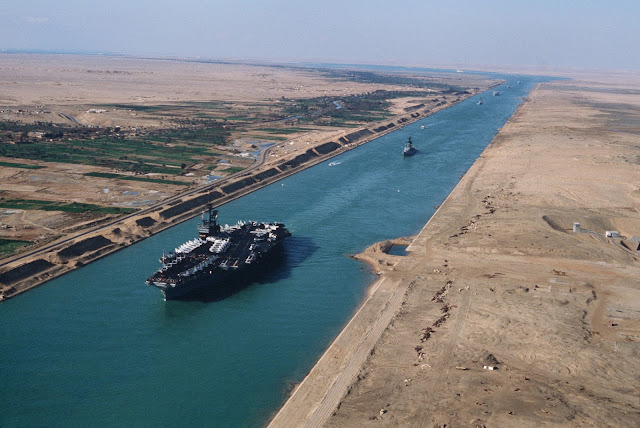
The U.S. military is heavily dependent on Egypt to move personnel and equipment to Afghanistan and around volatile parts of the Middle East, complicating U.S. efforts to place pressure on the Egyptian military in the wake of its violent crackdown on protesters.
"Egypt has been a cornerstone for the U.S. military presence in the Middle East," said James Phillips, an analyst at the Heritage Foundation.
During the past year, more than 2,000 U.S. military aircraft flew through Egyptian airspace, supporting missions in Afghanistan and throughout the Middle East, according to U.S. Central Command, which is responsible for the region.
About 35 to 45 U.S. 5th Fleet naval ships pass through the Suez Canal annually, including carrier strike groups, according to the Bahrain-based fleet. Egypt has allowed U.S. warships to be expedited, which often means getting to the head of a very long line of ships waiting for access to the canal.
"The Egyptian military has always been good to us," said Kenneth Pollack, an analyst at the Brookings Institution.
Egyptian cooperation is particularly critical at a time when the Pentagon is facing budget pressures and tensions with Iran remain high.
In response to the Egyptian military's bloody crackdown on protesters, President Obama announced this week the United States would cancel Bright Star, a training exercise with Egypt that had been scheduled for next month. Washington has also suspended the delivery of a shipment of F-16 fighter aircraft.
Obama stopped short of cutting off the $1.3 billion in annual military aid it supplies to Egypt, though some in Congress, including Sen. John McCain, R-Ariz., have called for cutting the aid.
In canceling the exercise the president said he was balancing the need to advance U.S. interests with "the principles that we believe in."
If Egypt cut off its airspace and canal access, the U.S. military would face heavier costs and much longer transit times as it positions troops and equipment in the Middle East.
For example, without access to the canal, which connects the Mediterranean Sea to the Red Sea, warships would generally have to sail around Africa in order to get to the Persian Gulf.
Analysts say Egypt's ruling military would probably not cut off air and sea access immediately if U.S. aid were cut, but the relationship might deteriorate rapidly, particularly if Egypt's generals feel they don't need the aid.
Persian Gulf states may take up some of the slack if the United States cuts its aid. Relieved that Egypt's military removed a Muslim Brotherhood government, Gulf nations, including Saudi Arabia, have already pledged billions of dollars to Egypt.
Historically, Egypt's leaders have been sensitive to the appearance that outside powers are pushing them around. Egypt closed the 120-mile long Suez Canal after the Six Day Arab-Israeli war in 1967.
No comments:
Post a Comment